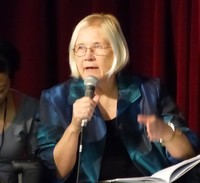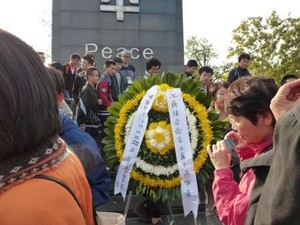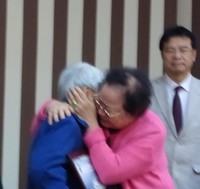Japanese Citizen Delegation Makes Apology for Japan’s Imperial Army’s Massacre of 300,000 in Nanjing, China in 1937
Japanese Citizen Delegation Makes Apology for Japan’s Imperial Army’s Massacre of 300,000 in Nanjing, China in 1937
In a memorable ceremony on October 25, 2013, a delegation of Japanese citizens made an emotional apology to the citizens of Nanjing, China for the massacre by the Japanese Imperial Army of 300,000 Chinese in the city of Nanjing in a six week period in 1937 during the Second Sino-Japanese War and the rape of thousands of women before they were put to death.
8 novembre 2013 - Ann Wright
The Japanese government has disputed the number of persons slaughtered by their Army and efforts by the Japanese government in rewriting the history of the “Rape of Nanjing” in educational materials have drawn sharp criticism.
One hundred Japanese and ten South Korean citizens travelled two hours by “bullet train” from the PEACE BOAT docked in Shanghai, China to the holocaust museum in Nanjing, China to learn the details of the 1937 massacre. 500 Japanese and 500 South Koreans were on the 8 day voyage of the PEACE BOAT Voyage for Understanding to Taiwan, Okinawa, Shanghai, South Korea and Japan.
As the only American citizen onboard the ship, I wanted to observe the reactions of the Japanese delegation as they toured the graphic displays of photographs and documents in the museum that reveal the horrific slaughter in Nanjing. As an American seeing several years ago at the Hiroshima Peace Museum, the displays of the deaths of 180,000 from the U.S. atomic bomb dropped on Hiroshima, I know the impact of witnessing through photographs the destructive power of one’s military, no matter the rationale the government gives for the necessity of using such force.
88 year old Cui Ying Yang told the delegation that she was 12 years old when the Japanese Army killed her 2 year old brother, her father and her grandfather in one day. She said that her 2 year old brother was killed in front of her. Her mother cried so much that she lost her eyesight. At age 12, Ms. Yang was forced to work in a Japanese military factory until the war ended in 1945.
Ms. Yang was joined by Ms. Yong-Soo Lee from our delegation. Ms. Lee, a South Korean citizen and now 84 years old, had been forced to be a “comfort woman” for Japanese military forces. Estimates range from 50,000 to 200,000 women from China, Korea, the Philippines, Taiwan, Burma, Indonesia and Japan were forced into sexual slavery for the Japanese Army. Less than 200 of the women are alive today. Ms. Lee testified before the U.S. Congress in 2007 after Japanese Prime Minister Abe had disputed whether the women were coerced into sexual slavery. A U.S. Congressional resolution based on the testimony of three women prodded Abe government to issue a formal apology, which it did not do. Abe is again the Prime Minister of Japan.
Upon meeting each other, the two elderly women broke into tears. The weight of what each woman had endured at the hands of the Japanese military was quite evident on the faces those in the Japanese delegation.
A young Japanese researcher, Natsuki Hatae, one of the other guest speakers on the ship and co-founder of Bridge for Peace, made a tearful apology to the people of Nanjing. She explained that she never learned in school about the atrocities committed by the Japanese Army. She now conducts interviews with elderly Japanese who were former soldiers in the Japanese Army and who regret their roles in the military operations. She shows the videos to Japanese schools. She also goes to South Korea, the Philippines and China and records the reactions of families who had family members killed by the Japanese Army.
PEACE BOAT co-founder Yushioka Tatsuya said that one of the goals of the PEACE BOAT is to take people to areas of conflict to learn first-hand about the issues and to provide an opportunity for passengers to meet people from that place, understand their situation and form bonds of people-to-people friendship.
About the Author:
 Ann Wright served 29 years in the US Army/Army Reserves and retired as a Colonel. She was a US diplomat for 16 years and resigned in 2003 in opposition to the war on Iraq.
Ann Wright served 29 years in the US Army/Army Reserves and retired as a Colonel. She was a US diplomat for 16 years and resigned in 2003 in opposition to the war on Iraq.
Copyright © Ann Wright




